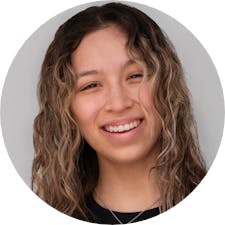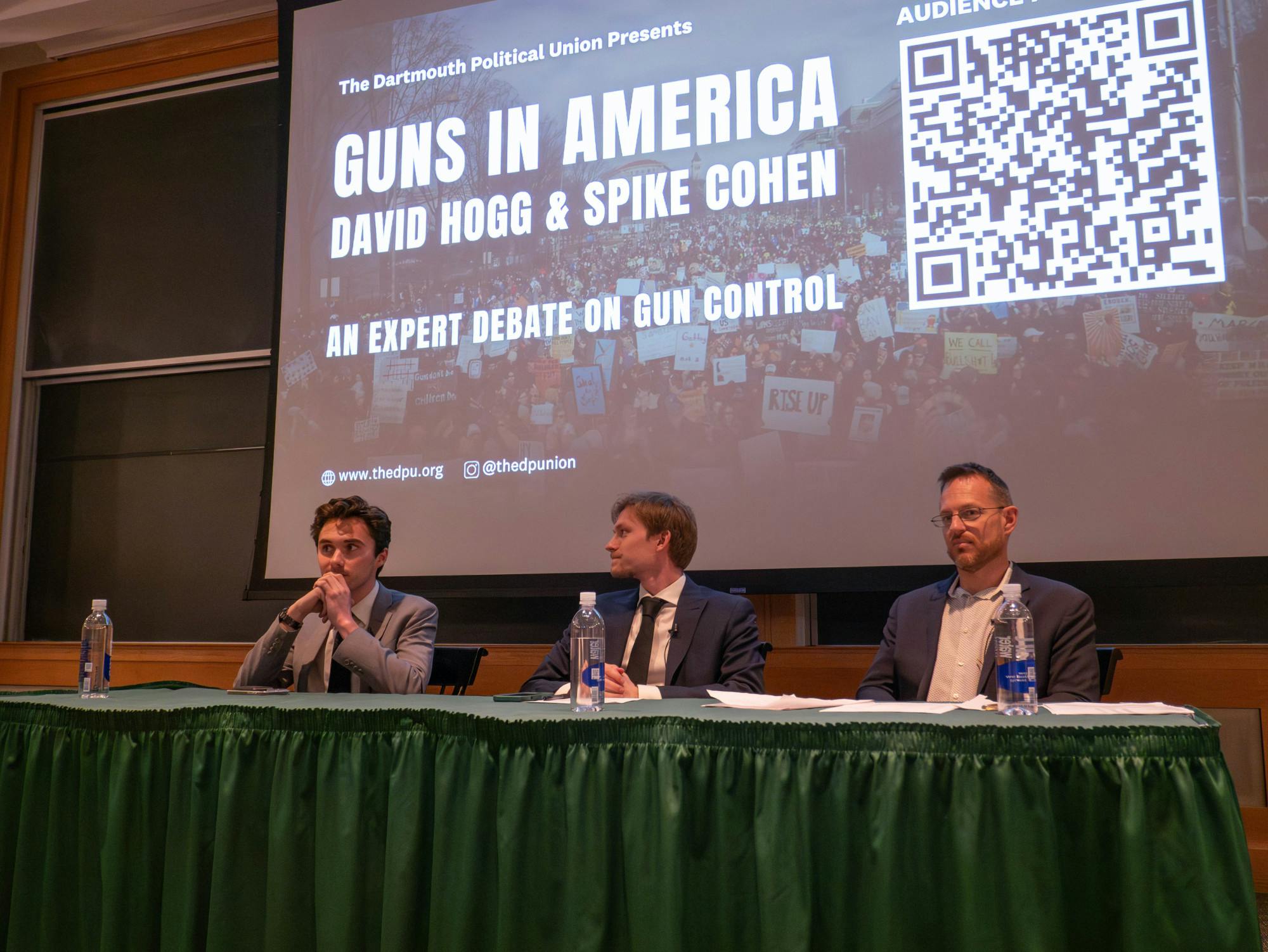On April 10, the Dartmouth Political Union hosted a debate on gun control legislation between David Hogg — a 2018 Marjory Stoneman Douglas High School shooting survivor and March for Our Lives cofounder — and 2020 Libertarian vice presidential candidate Jeremy “Spike” Cohen. The debate was moderated by Grayling Peterson ’24, president of the Dartmouth Libertarians and a two-year ambassador for the DPU. Approximately 100 community members attended the event in person, while more than 30,000 joined virtually or have viewed the livestream recording since, according to DPU president emeritus Jessica Chiriboga ’24.
Chiriboga opened the debate by introducing Hogg and Cohen and announcing the results of a pre-debate survey that assessed attendees’ opinions on gun ownership policy. Of the 174 responses collected, around 74% responded that they felt gun ownership increases safety, while around 72% did not favor stricter gun laws. According to Chiriboga, the results may have been skewed by participation from livestream viewers, as she noted that there were “more respondents” than people present at the event.
Many of the viewers who joined through the livestream were part of watch parties in support of Cohen. While Cohen said during the debate that he did not “set up” the watch parties, he said he “let people know” after learning about their existence. Some audience members also traveled from beyond the Upper Valley to attend the event live. One student, who requested anonymity to avoid being affiliated with the event, said she spoke to a man who had traveled from Detroit to support Cohen. Throughout the debate, the man “harrassed Hogg” by holding up memes to the audience to mock him, she said.
In Hogg’s opening statement, he said he believes gun control legislation should not only address access to guns, but also “why someone picks up a gun in the first place.” Hogg said his experience as a member of the Harvard Sportsmen’s Club taught him that gun ownership brings both “power” and “responsibility.”
“I don’t see why … someone who repeatedly threatens to shoot up a high school should be able to legally continue to own … an AR-15,” he said. “I don’t believe that’s an affront to anyone’s civil liberties. I believe it’s actually a protection of all of our [liberties] and to our right to things like domestic tranquility.”
In Cohen’s opening statement, he acknowledged points that he and Hogg would “probably” agree upon — such as the need to address gun violence in the United States — but said they would likely differ in their beliefs about mechanisms for violence prevention. Cohen said he does not believe owning a firearm makes people more violent and argued that gun control violates civil rights.
“From the very moment of the beginning of your existence you have rights that are not supposed to be infringed upon by anyone — we call them natural rights,” he said. “Two of those rights are the right to defend yourself and others and the right to own justly acquired property. What that amounts to is that you have a preexisting natural right to keep and bear arms for the defense of yourself and others.”
Throughout the debate, Hogg advocated for the United States to federalize Massachusetts’s state gun laws. He said Massachusetts has the highest standard of gun ownership and a gun death rate 70% lower than the national average. Hogg also said he supports more research into ways to prevent gun violence. Lobbying by the National Rifle Association of America led to the 1996 passage of the Dickey Amendment, which prohibits federal funds from being used to conduct research on gun control policy and thus has broadly restricted studies about effective gun control policy, he said.
Cohen argued that there is no correlation between rate of gun ownership and gun murder rates, claiming that “it ain’t the guns.” Cohen added that he believes the right to own a gun should not be limited in any way, despite the fact that a vast majority of the American public supports gun control laws in some capacity. He cited the 1857 Dred Scott v. Sandford decision — in which the Supreme Court ruled that enslaved people were not citizens of the United States and therefore were not awarded protection as such — as an example of “what happens when you let a majority population decide that a minority population shouldn’t be allowed to exercise some of their rights.”
Hogg said he attributes the disproportionately high frequency of school shootings in the United States to the fact that the country has one of the highest rates of gun ownership — 32% of Americans own a gun, according to the Pew Research Center. As a result of more people owning guns, there is likely to be a high rate of gun violence, gun suicides and mass shootings compared to similarly developed countries that have much stricter gun laws, Hogg said.
Cohen, on the other hand, attributed school shootings to Title XVII of the Crime Control Act of 1990, which made it a federal crime to carry firearms in school zones and introduced student resource officers to schools. As a result, potential school shooters know most people in school zones are unarmed, with the exception of student resource officers who have been historically ineffective in active shooter situations, he said. Before the 1960s, he said, school shootings were not prevalent and “many schools” even had shooting ranges to teach students proper gun use.
Hogg and Cohen agreed that student resource officers in schools are ineffective in stopping school shootings. Hogg said he thinks schools should be gun-free zones because they should not be “prisons” or “police states.” Cohen said — while he is “not sure” if guns should be present on school campuses — he also does not think “over-policing” students is the solution to gun violence. He said that “cops are hammers and everyone is a nail,” noting that he believes police officers are looking for reasons to punish students.
However, Hogg and Cohen disagreed on solutions to reduce mass shootings and gun violence in general. They debated the efficacy of mainstream proposals for gun control, such as an assault weapons ban, voluntary gun buybacks, universal background checks, red flag laws, a national registry of gun sales and increasing the minimum age requirement for the legal purchase of firearms.
In their concluding remarks, both Hogg and Cohen said that they would have liked more time to be able to discuss the points on which they agree — such as the urgency of addressing the mental health crisis and poverty — in order to find more common ground on ways to reduce the overall amount of violence in the country. They also agreed that they are open to dialogues with differing perspectives and are hopeful about making progress on the perspectives they share.
In the DPU’s post-debate survey, about 53% of attendees reported that gun ownership decreases safety, while around 71% of attendees favored stricter gun laws. The post-debate survey received 41 responses, since Chiriboga asked that only in-person attendees participate.
DPU technical director Samay Sahu ’27 said after the debate that he believed Hogg and Cohen represented the values of the DPU well by promoting discourse without tension.
“[Some previous panelists] were very tense and, at some points, engaged in unproductive back and forths,” he said. “This debate was very different, with [Hogg and Cohen] both pledging on numerous occasions to work to find common ground and find unity amongst divisions, which is the mission of the DPU.”
Peterson praised both debaters for their peaceful approaches to the conversation.
“It was a little stressful, but I knew that they were both coming into this with good intentions and going to be good speakers and respectful,” he said.
Correction Appended (April 14, 10:11 p.m.): A previous version of this article stated that Samay Sahu ’27 is a DPU ambassador. Sahu is the DPU technical director. The article has been updated.

Alesandra Gonzales is a reporter, photographer, and videographer for The Dartmouth from south Texas, majoring in psychology with a minor in film. Outside of The D, she likes to workout, watch The Ranch, and do EMS work. She is a licensed EMT in three states.




